Starting A D2C Brand In India: Why Now Is The Right Time To Sell Online
by Team Inc42- D2C adoption in India has been on the rise from the point of initial lockdowns for retailers imposed by the Government, currently reaching over 500 brands
- With a faster take-to-market, more control over brand perception, and direct to consumer interaction, Indian brands are leveraging online channels to reach consumers and make sales
- With tools like Shopify enabling quick online store set up along with a plethora of plug and play tools for better marketing, D2C brands are scaling online channels at twice the rate as compared to offline
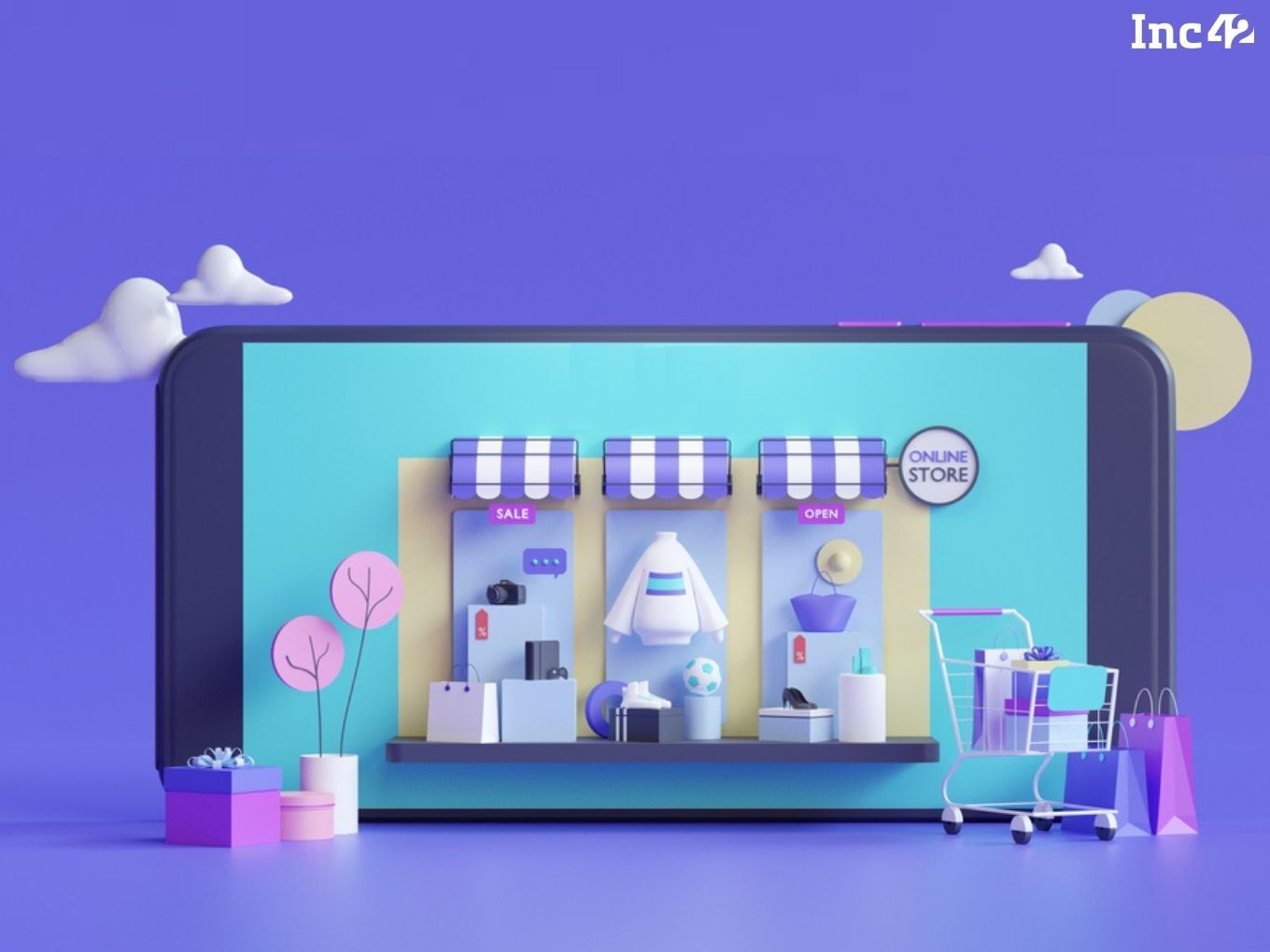
In the last few months, consumers have become more than wary about stepping out, choosing to purchase even the most essential of products from the safety of their own homes. What’s more, with more people staying in, the consumption of online content has increased. For brands who had already been selling online, this changing tide means an opportunity for better customer acquisition and higher sales. But for brands that are exploring the digital landscape for the first time, it’s the most opportune time to get discovered.
The changes in consumer behaviour has not only given a bigger impetus for online delivery but has made direct-to-consumer or D2C the only option for brands.
India’s Ecommerce Boom
In 2017, Amazon India recorded $500 Mn in sales and in another 10 years, this number is estimated to reach $200 Bn.
Global reports have found that India is the fastest-growing market for ecommerce businesses. International digital consumption and buying trends have trickled down into Indian customer behaviour and added to their list of needs. Coupled with advanced technological support from apps and online selling tools for small businesses and startups, the stage is perfectly set for ecommerce success. According to reports, India is estimated to have approximately 330 Mn digital buyers this year, an addressable base that dwarfs many larger economies of the world, but the key will be in unlocking revenue.
While the adoption of online shopping has gotten more popular in recent years, the Covid-19 pandemic has only increased the number of online shoppers, with consumers opting for safety and convenience first. Irrespective of where they are from, consumers are choosing to even buy essentials and daily necessities such as grocery through ecommerce platforms and D2C channels. This clearly indicates a growing opportunity for such D2C brands as well as online verticals of traditional retail players in India.
Being one of the worst impacted sectors during the pandemic, India’s retail market has tried to fight back the disruption by adopting digital selling tools and technology — perhaps some of the impact of the pandemic might have been minimised had this shift happened earlier.
More than 80% of all retail outlets in India (most of these sole proprietorships or so-called mom-and-pop stores) operate in the cash-driven informal economy compared to 55% of retailers in China and 35% in Brazil. These retailers were not a direct part of the ecommerce wave earlier, but are now looking to come online through hyperlocal delivery platforms such as Dunzo, Zomato, Swiggy, and others. And many have also chosen to launch independent ecommerce platforms.
The pandemic has forced several retail giants to chase the online route to connect with consumers at a time when advertising had been severely hit — such retail giants looked to earn higher returns on their marketing investment by targetting online channels to replace TV and print advertising.
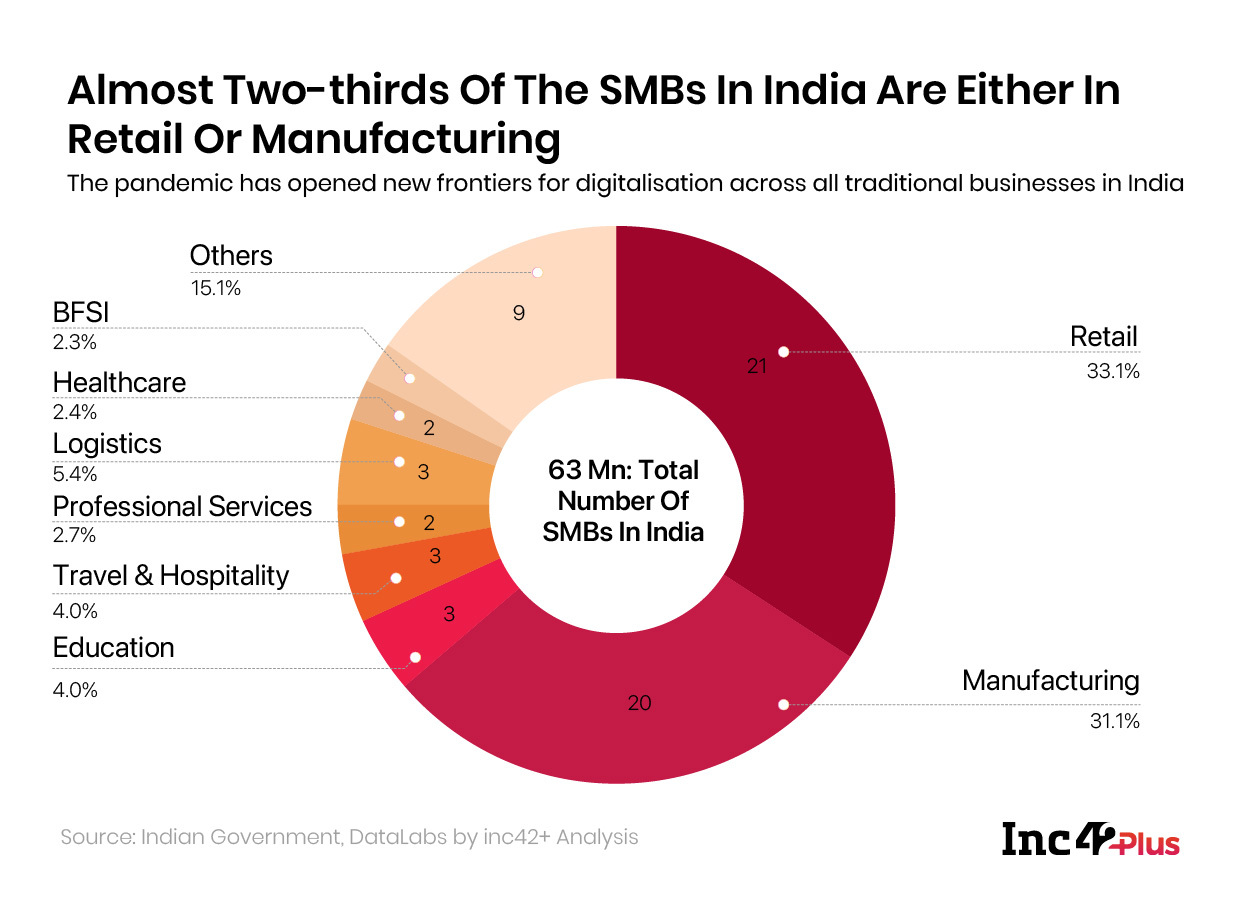
According to a recent report by Inc42 Plus, the retail sector is amongst the top five sectors which have a high degree of digitisation.
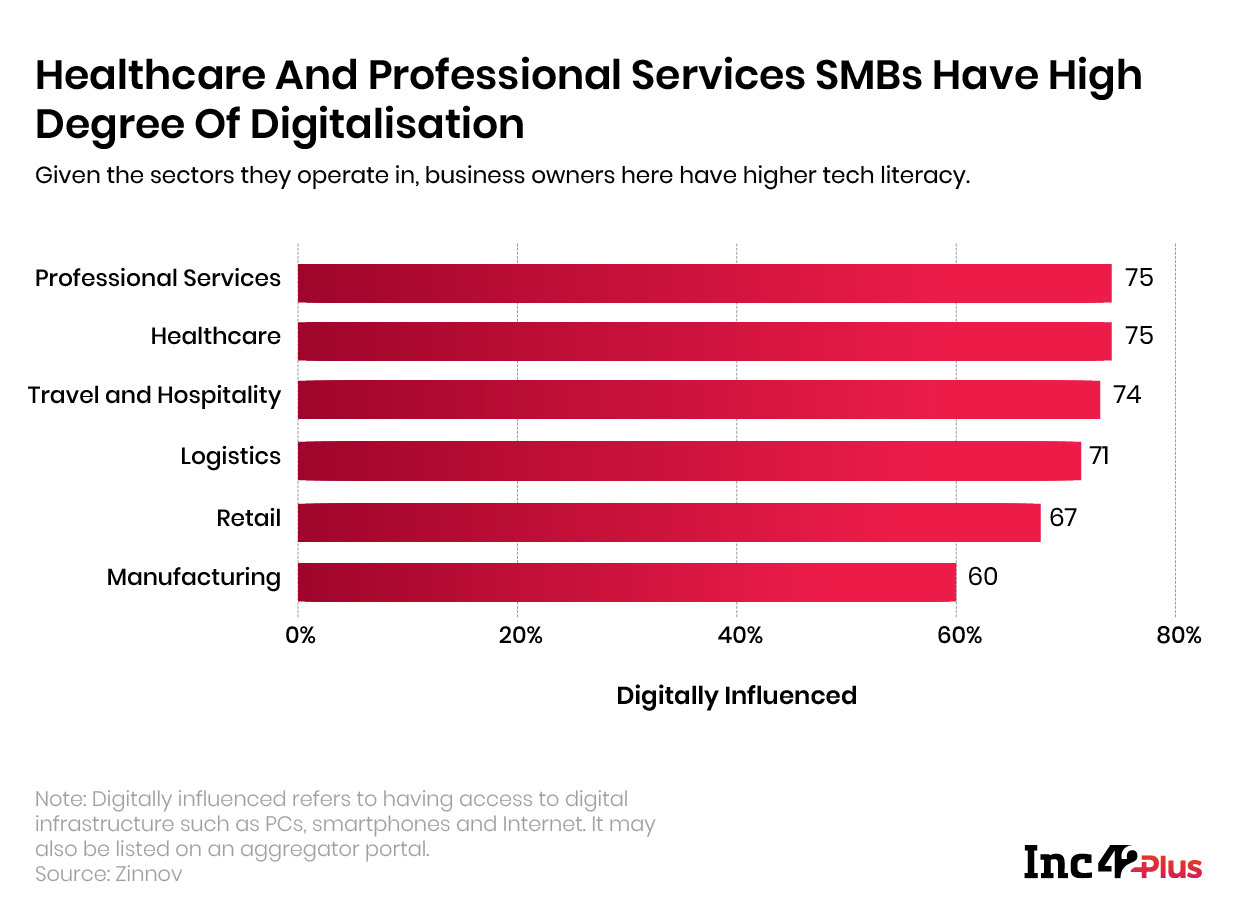
Government initiatives, policies catering to domestic ecommerce startups and local products, and foreign investments into Indian brands are further fuelling the wave and bringing more new-age merchants under the D2C fold.
What Sets A D2C Brand Apart?
Put simply, direct-to-consumer brands are companies that manufacture, market, sell & ship their products to customers without relying on middlemen such as distributors or traditional retail stores. D2C companies are almost exclusively “digital-first”, i.e. either started digitally or where digital channels act as the primary point of engagement (marketing and sales, customer support, fulfillment, returns, and exchanges) with consumers.
D2C brands distribute their products primarily via their own branded channels. These channels may be an ecommerce website or platform, social media or a retail store. Physical stores by D2C brands are primarily designed to boost brand awareness and customer engagement that will encourage more sales online.
The D2C segment has already seen startups and brands emerging in key areas — mattress brands such as Wakefit, Sunday, Sleepycat; fashion startups such as Bombay Shirt Company, Henry & Smith, Label Life, cosmetics brands such as Sugar, The Man Company, Mamearth, The Moms Co well as traditional retail players such as Saraf Furniture, Specsmakers, Marks & Spencer and others have also been opening online stores, hinting at a major change in the retail landscape.
Why Go D2C? The Benefits
Besides the opportunity to earn higher margins on orders placed as compared to selling via aggregators and marketplaces, the D2C model has a host of advantages that businesses are leveraging.
Direct Consumer Interaction
Consumer needs are evolving faster than ever. The D2C model provides businesses an opportunity to interact with the people or the potential buyers. Traditional methods relied on conducting surveys and market research, which did help give businesses a direction but lacked the focus on understanding the evolving needs and the reasons behind them.
Running a D2C business gives an opportunity to have direct contact with the consumer at every stage of the sale process. This gives insights into the concerns a buyer has at every stage, what they expect from the brand and how a business can resolve them to offer a better shopping experience, thereby increasing your business’s market share.
Reduced Time To Market
A typical consumer packaged good (CPG) takes around 18-36 months from inception to the point of availability in the market. In addition to the time and resources taken here, CPG companies also have to keep in mind the approvals of the shareholders, further slowing them down and often resulting in not being able to tap into a current market need.
With D2C, businesses have the flexibility of running agile. They can launch a product on a smaller scale, validate the need for it and establish a market growth plan accordingly. This model also gives businesses the ability to understand consumer needs faster to make the appropriate changes to their products on time.
“With extended lockdowns and increased traffic in online marketplaces, D2C is becoming more popular because it’s faster and easier to place an order with a brand. The WhatsApp store makes it all the more convenient. A smooth and seamless experience will surely help D2C to catch up quickly,” Aswani Chaitanya, CEO and cofounder of snacks brand Timios, told Inc42.
Control Over Brand Identity
In the traditional manufacturer-retailer relationship, manufacturers get limited control over the brand and its messaging as the goods pass through various opaque layers where this messaging is diluted. Of course, they have control over the packaging of products and outbound marketing activities, but once the products hit the shelves in their target market, the manufacturer has no control over what influences the sales and how the brand is perceived by the consumer. That’s in the hands of the retailers.
In D2C, the business has complete control from start to finish. They get to decide how the product needs to be packaged, what marketing message needs to be used for promoting them, how they’re taken to the hands of the consumers and the post-purchase experience. The business does not need to rely on third-party retailers and distributors.
Ability To Leverage Personalised Recommendations
Ever glanced at a product in a retail store only to later have trouble finding it on the shelves? With the right strategies in place, D2C brands selling online don’t have to worry about this negative customer experience. Brands can provide a personalised experience to shoppers by displaying product recommendations tailored to the shopper.
By placing recommendations across different touchpoints of the store, a brand or business can introduce consumers to more products and sub-brands, lowering drop-offs, increasing AOV, and create more chances for your brand to capture a new purchase.
Considering that 35% of Amazon’s total revenues come from purchases of products that customers found through recommendations, D2C brands need to adopt a strategy to channel these potential sales to their platform.
Ability To Tap Into Multiple Integrated Sales Channels
Many D2C brands miss out on acquiring new consumers who are already interested in their products because they are not available on the channels that these consumers would shop. When setting up your ecommerce business on platforms like Shopify, you can diversify your sales channels and list your products on marketplaces such as Amazon, eBay, Etsy, etc by integrating it with the ecommerce platform you choose to host your store.
This can give you the opportunity to increase your visibility, acquire a larger customer base, and generate more revenue while managing it all on one dashboard.
Ability To Understand The Market Performance
The emergence of ecommerce platforms like Shopify has made it easier for D2C brands to set up a holistic analytics dashboard and understand their store performance and growth. Using these insights, D2C businesses can compare marketing strategies, understand revenue by traffic streams, see which products aren’t selling, and make data-driven decisions accordingly.
There’s no doubt that ecommerce has enabled D2C brands to take their product to the consumers directly, helping them sell quicker and smarter. But let’s take a look into what else other than the benefits stated above, which makes the D2C model successful.
This also further aids the ability to run lean with the D2C business model, making starting a business online, more feasible. “While building a successful ‘want’ product has been more difficult than the ‘need’ product, with forceful pivots happening towards digital because of the pandemic, the growth for D2C across both need and want, seen today may not go away. So even after the virus goes away and people step out, the numbers for D2C startups would be better than before,” believes Ishpreet Singh Gandhi, founder & managing partner at Stride Ventures.
Building a D2C Brand From The Ground Up
Unlike the past, when businesses needed a huge IT team and many months to launch an ecommerce website, today it is a matter of weeks and anyone can do it with ready to use ecommerce platform software or SaaS tools which help business sell products and services online, along with managing the website, the marketing, sales, and others.
Also Read: The Ecommerce Enablers Empowering India’s D2C Rush
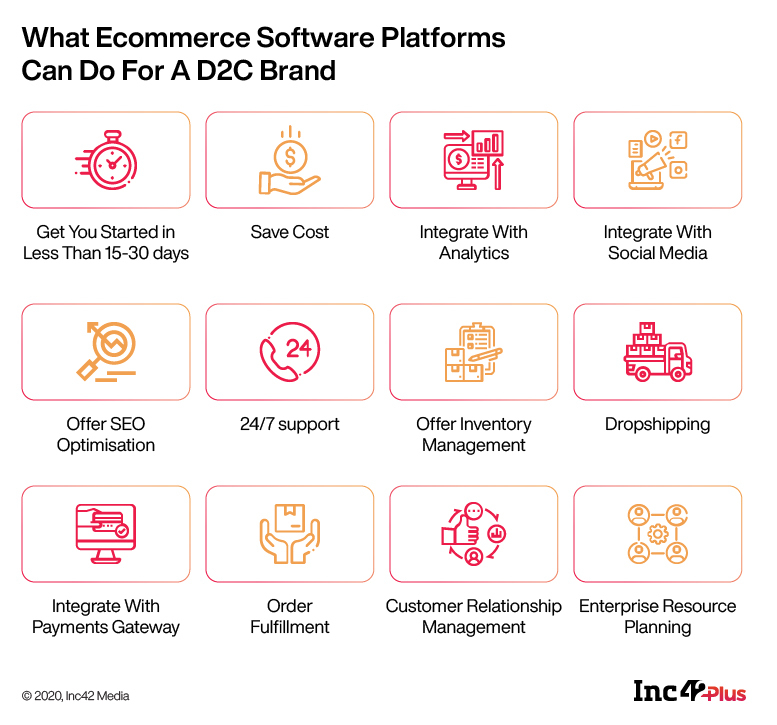
Ecommerce platforms like Shopify are enabling small-town retailers, offline brands, home-grown businesses, and more to take their brand online. The ecommerce platform is built to offer ease of set up and a quick take to market, aligning with the benefits of selling D2C.
For instance, Claro Agro was one of the first few to launch a D2C grocery brand in India with Shopify, which took the company less than a week. This made the brand independent of food aggregators, retailer partners, and distributors.
From a drag and drop editor to setting up the online store, product pages, and collections, to simplifying inventory management with powerful integrated apps, a host of plug and play solutions for marketing and automation, and a secure channel to offer customers to purchase over, the ecommerce platform takes care of it all.
In fact, Shopify has also tied up with leading retail solutions to offer a back to business bundle that saves companies more than 1 Lakh INR while setting up the store and getting things in motion.
Inc42 has partnered with Shopify to enable businesses to go online. Shopify is offering an exclusive 3-months free access to their ecommerce platform to Inc42 Plus members. Click here to avail the offer.
But adapting a brand to the D2C model is more than just setting up an online store. It requires companies to understand the market needs, continually analyse the market performance, customer data, and keep shoppers engaged across channels to drive in consistent revenue.
Right from customer engagement by CleverTap to mapping customer lifecycle automatically with MoEngage to tracking sales, customer service, and more with Wigzo and other solutions, Indian startups have opened their technologies to enable automation across various ecommerce processes.
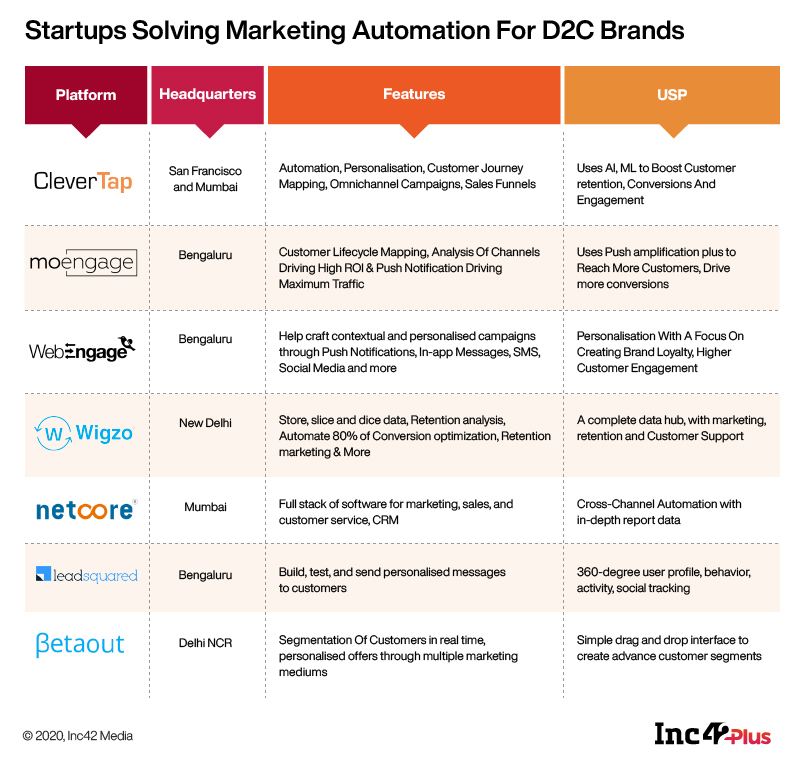
Sign up for Inc42 Plus and get deals worth $150K from companies like Shopify, DigitalOcean, MoEngage, HubSpot for taking and expanding your D2C Business Online! Click here to avail offers.